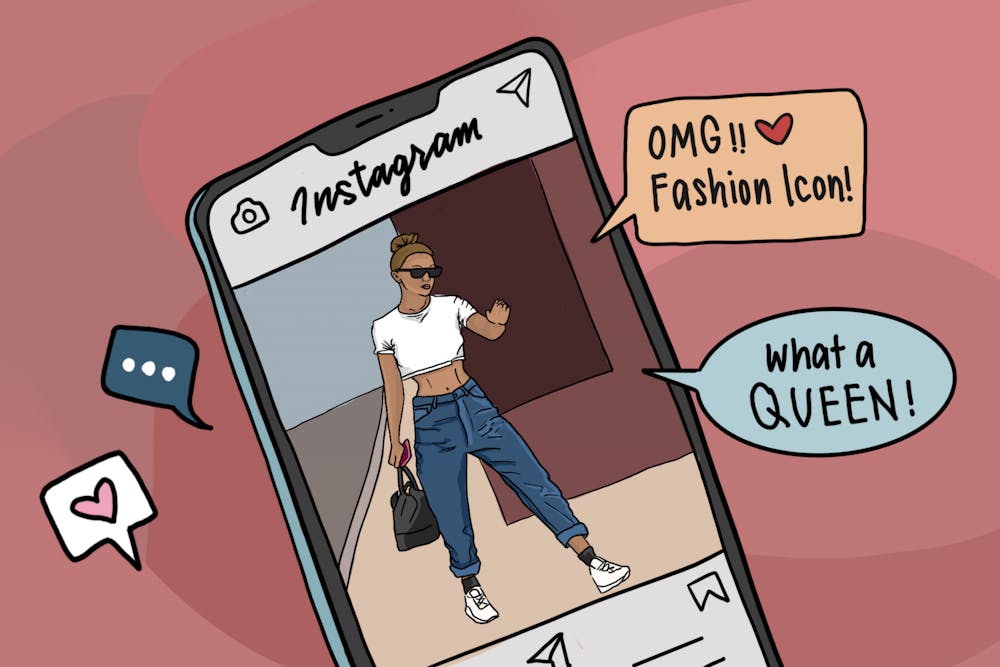Too often on most social media, “fashionable” really just means “skinny,” as Twitter, Instagram, and TikTok users glorify trendily unflattering “normcore” outfits on slim body types and demonize anyone else trying to mimic the style. Thankfully, the predominantly fatphobic culture is starting to shift as the “skinny or fashionable” trend, which started in July on TikTok and Twitter, calls out the double standard.
The original iteration of the trend started with a series of TikToks from user @senorapattinson where Pattinson compiles a sequence of photos of celebrities like Hailey Baldwin and Bella Hadid and deems them “actually fashionable” or decides that they’re “just skinny.”
And a slightly less lighthearted tweet from writer and youth activist Rayne Fisher-Quann went viral for calling out a tweet mocking two women’s outfits by saying “i swear to god if bella hadid wore this exact outfit it would be on a million ‘80s casual inspo’ pinterest boards bc, as always, fashion is judged exclusively by the bodies that wear it.”
The wave of similar TikToks, Instagram posts, and tweets these two posts spawned shows that social media users are beginning to not only recognize, but also to actively bring awareness to and counter the privilege that thin people have in the world of fashion. They’re allowed, even encouraged, to participate in trends that are centered around playing with class aesthetics – clothing that’s associated with poorness is celebrated when it’s put on a thin body, but the two women in the photo from Fisher-Quann’s tweet are ridiculed for wearing “Walmart fashion.” And thus, we see that it’s not the clothing itself that’s considered aspirational and aesthetic, it’s just the concept of juxtaposing “unflattering” clothing with a stereotypically attractive body type. Once the same trendy light wash mom jeans and faded, touristy T-shirt are placed on any other body type, the outfit suddenly loses its aspirational value, and with it, its categorization as “fashionable,” because from a young age, we’ve been fed the idea by social media that a body that’s not supermodel slim and perfectly toned is unattractive and unappealing.
The impact this toxic culture has on young girls and women, who make up a significant portion of social media users, has been studied extensively – and none of the results look good. Diet videos, workout regimens, and “thinspo” are prevalent on apps like TikTok and Instagram where the user demographic is primarily young women, all of which feeds into the mentality that causes an overwhelming 68-84% of women in the United States to have body insecurity issues.
That being said, our social media–obsessed generation is far from being the only one that’s been affected by pressure to look a certain way (and in fact the current fatphobia that exists in society and the fashion industry has its roots in sexism, classism, racism, and more), but we are the first to have widespread movements retaliating against it. The #bodypositive movement gained popularity in 2012 as a beneficial counter–trend to the exaggerated Photoshopping of Instagram photos and prevalent diet culture on social media in general, but actual recognition of so–called “skinny privilege” hasn’t been around for long.
It’s great that current social media trends like “skinny or fashionable” are bringing awareness to skinny privilege, but it’s going to take a lot to change something that’s so deeply ingrained in Western culture that most of us don’t even recognize the biases we have surrounding body types that are different from the beauty standard. We often shy away from using the word “fat” in reference to someone’s body but only because our society has made it a hurtful descriptor that’s linked to unattractiveness and undesirability time and time again.
This discomfort we have at using a word that should be divorced entirely from positive or negative connotations reveals our own implicit biases and the recurring fatphobia that exists in society – something that can only be remedied by recognizing it in ourselves and others and holding ourselves accountable. The “skinny or fashionable” trend, in helping us all recognize our own biases and those that exist in others, will hopefully in the future be a catalyst for major change in the way bodies are viewed. If nothing else, it’s a step towards body neutrality and acceptance on the long journey towards celebrating all body types and appreciating fashion for fashion’s sake rather than idolizing the body on which it appears.

